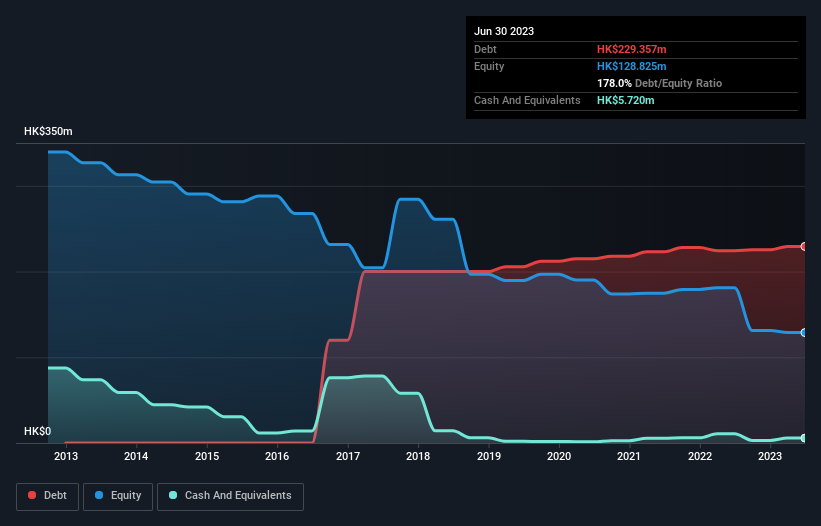
Some say volatility, rather than debt, is the best way to think about risk as an investor, but Warren Buffett famously said that 'Volatility is far from synonymous with risk.' When we think about how risky a company is, we always like to look at its use of debt, since debt overload can lead to ruin. We can see that China Asia Valley Group Limited (HKG:63) does use debt in its business. But should shareholders be worried about its use of debt?
When Is Debt A Problem?
Debt is a tool to help businesses grow, but if a business is incapable of paying off its lenders, then it exists at their mercy. If things get really bad, the lenders can take control of the business. However, a more usual (but still expensive) situation is where a company must dilute shareholders at a cheap share price simply to get debt under control. Of course, debt can be an important tool in businesses, particularly capital heavy businesses. The first thing to do when considering how much debt a business uses is to look at its cash and debt together.
View our latest analysis for China Asia Valley Group
What Is China Asia Valley Group's Debt?
The chart below, which you can click on for greater detail, shows that China Asia Valley Group had HK$229.4m in debt in June 2023; about the same as the year before. However, it also had HK$5.72m in cash, and so its net debt is HK$223.6m.

How Strong Is China Asia Valley Group's Balance Sheet?
Zooming in on the latest balance sheet data, we can see that China Asia Valley Group had liabilities of HK$244.9m due within 12 months and liabilities of HK$1.03m due beyond that. Offsetting this, it had HK$5.72m in cash and HK$7.60m in receivables that were due within 12 months. So it has liabilities totalling HK$232.7m more than its cash and near-term receivables, combined.
China Asia Valley Group has a market capitalization of HK$420.0m, so it could very likely raise cash to ameliorate its balance sheet, if the need arose. But it's clear that we should definitely closely examine whether it can manage its debt without dilution. When analysing debt levels, the balance sheet is the obvious place to start. But it is China Asia Valley Group's earnings that will influence how the balance sheet holds up in the future. So if you're keen to discover more about its earnings, it might be worth checking out this graph of its long term earnings trend.
In the last year China Asia Valley Group had a loss before interest and tax, and actually shrunk its revenue by 5.3%, to HK$39m. That's not what we would hope to see.
Caveat Emptor
Importantly, China Asia Valley Group had an earnings before interest and tax (EBIT) loss over the last year. To be specific the EBIT loss came in at HK$832k. When we look at that and recall the liabilities on its balance sheet, relative to cash, it seems unwise to us for the company to have any debt. Quite frankly we think the balance sheet is far from match-fit, although it could be improved with time. We would feel better if it turned its trailing twelve month loss of HK$52m into a profit. So to be blunt we do think it is risky. There's no doubt that we learn most about debt from the balance sheet. But ultimately, every company can contain risks that exist outside of the balance sheet. We've identified 4 warning signs with China Asia Valley Group (at least 1 which is a bit concerning) , and understanding them should be part of your investment process.
Of course, if you're the type of investor who prefers buying stocks without the burden of debt, then don't hesitate to discover our exclusive list of net cash growth stocks, today.
If you're looking to trade China Asia Valley Group, open an account with the lowest-cost platform trusted by professionals, Interactive Brokers.
With clients in over 200 countries and territories, and access to 160 markets, IBKR lets you trade stocks, options, futures, forex, bonds and funds from a single integrated account.
Enjoy no hidden fees, no account minimums, and FX conversion rates as low as 0.03%, far better than what most brokers offer.
Sponsored ContentNew: AI Stock Screener & Alerts
Our new AI Stock Screener scans the market every day to uncover opportunities.
• Dividend Powerhouses (3%+ Yield)
• Undervalued Small Caps with Insider Buying
• High growth Tech and AI Companies
Or build your own from over 50 metrics.
Have feedback on this article? Concerned about the content? Get in touch with us directly. Alternatively, email editorial-team (at) simplywallst.com.
This article by Simply Wall St is general in nature. We provide commentary based on historical data and analyst forecasts only using an unbiased methodology and our articles are not intended to be financial advice. It does not constitute a recommendation to buy or sell any stock, and does not take account of your objectives, or your financial situation. We aim to bring you long-term focused analysis driven by fundamental data. Note that our analysis may not factor in the latest price-sensitive company announcements or qualitative material. Simply Wall St has no position in any stocks mentioned.
About SEHK:63
China Asia Valley Group
An investment holding company, engages in property management business in Japan and the People’s Republic of China.
Slight with acceptable track record.
Similar Companies
Market Insights
Community Narratives



